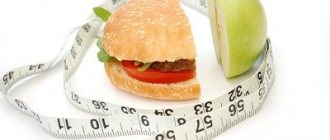Nutritionist, author of seminars on proper nutrition and healthy lifestyle Natalia Afanasyeva:
— A year is a non-random time period. It has been proven that the human body takes about 13 months to fully change the body at the biochemical level. As a rule, the first six months are the active phase of weight loss. And for the next six months you need to control your weight and gradually return to a normal calorie balance. Of course, you should completely avoid harmful foods.
Certified fitness and bodybuilding trainer Anna Kiryukhina:
- Firstly, before any weight loss you need to evaluate your lifestyle. Those who have a sedentary job need to start increasing physical activity even before hard training. For example, not using the elevator, but walking up the stairs, forcing yourself to walk.
January
Nutritionist : start keeping a food diary and immediately write down by what specific date you plan to finish losing weight. Before dieting, undergo a full medical examination. Determine your norm. Immediately try to drink more water rather than tea or coffee. And reduce the amount of sugar, simple carbohydrates and fats.
Fitness trainer : for health, a person must take 5 thousand steps a day, which is 3.5 km. In the first month, get used to this. But make sure that you have no contraindications to sports. In addition, do an analysis of your body mass index, which shows the amount of fat, muscle, etc. This way you will identify problems and understand what kind of load you can expect.
Article on the topic
Diagnosis by eye. 7 signs of a bad nutritionist
Weight loss plan for January
Take a comprehensive blood and urine test and be examined by a family doctor/general practitioner to assess your general health. Measure your current weight and main body measurements (waist, abdomen, hips, chest, neck, arms and legs).
Now write down what weight you want to achieve, what your ideal body parameters should be. Just think objectively: if you have a lot of excess weight, set a plan for the year, taking into account the fact that you can lose 3-5 kg per month without harm to your health.
Place your goal somewhere in a visible place, next to it you can indicate what weight normalization will give you, for example, the opportunity to wear your favorite things, the pride of loved ones, sexuality, normalization of hormonal levels, improved well-being, lightness, etc. Try to come up with at least 10 motivational reasons. Write them in order of importance to you.
If you have difficulty compiling this list, then list in your mind what is really bothering you about being overweight right now. These may be difficulties in training, increased fatigue, the inability to buy clothes you like, ridicule from colleagues or friends. Based on this, make a list of motivations.
Start keeping a food diary, where you write down everything you ate and drank during the day (time of eating or drinking, what you ate/drank and how much). Analyze your records for two weeks, see what foods you eat most often, what are the intervals between meals, what and how much you drink.
It wouldn’t hurt to write down your emotional state before and after eating. This makes it easier to track what your appetite depends on, whether you enjoy food, whether you have eating disorders and which ones.
Be sure to indicate in your diary the moments when you ate with company, just out of boredom, while watching TV, etc. All this is extremely important for analyzing the situation, and if you want to seek help from a nutritionist or nutrition consultant, this will make it much easier for him to understand your problem.
If you are not mentally ready for significant changes, then start small. Even with small steps towards your goal, you will sooner or later reach your destination - the main thing is to keep moving and not retreat back.
This month, simply reduce the sugar in tea and coffee by 1 teaspoon, give up sweet soda, at least slightly reduce the amount of sweets in your diet and try to eat them before 12:00 (but definitely not later than 15:00 or before bed). Gradually add 1 glass per week to the usual amount of water you drink. By the end of this month, you should drink at least 1 liter of water per day.
For physical exercise, start by taking at least 5,000 steps a day (that’s about 3.5 km).
February
Dietitian : Find a mentor or support group. It's a great idea to come up with reward gifts for yourself that don't involve food! A gift could be, for example, a trip with friends to an interesting event. Establish a meal plan, keep a journal, and carry snacks with you.
Try to eat more vegetables and fruits this month.
Fitness trainer : don’t go too hard on sports—take care of your meals. The interval between meals should be 3 hours. Train yourself to eat, especially breakfast.
Start walking not 5, but 10 thousand steps on the weekend.
March
Nutritionist : It's time to do a cleansing program for the liver and intestines. Try doing fasting days sometimes. To ensure that the body does not experience a deficiency of elements necessary for health, add a full set of vitamins.
In addition to keeping a food diary, you can also make a shopping list so you don't miss out on unnecessary items at the store. And it’s better to go grocery shopping on a full stomach.
Fitness trainer : gradually add household activity, you can buy a stepper and add steps in the evenings for 10-15 minutes before bed.
Introduce the habit of not eating 2 hours before bedtime.
The body has its own diet. Who does healthy eating kill and why? Read more
Breakfast: how to choose time and products
Let's start by choosing the ideal time for breakfast.
The moment you eat breakfast or drink your first cup of coffee or tea is the beginning of your nutrition window. If breakfast starts at 8 am, dinner should end at 8 pm. The last few hours of fasting in the evening are very important. Imagine that you are cleaning out your house and placing all the bags of trash right outside the front door. Suddenly, a wind blows and knocks over the garbage bags, and all your efforts go down the drain.
Something similar happens when you eat breakfast earlier than usual in the morning. If your body doesn't expect a lot of food to come in, then all its efforts spent on cleansing the body at night will go down the drain. This is especially important when following a 12-hour eating cycle. If your eating window is 8-10 hours, occasional instances of eating breakfast too early won't cause too much harm to the cleansing process.
In the first two weeks, you can eat whenever you want within a set window, but it will be better if you eat on a schedule between the first and last portion of calories. As your eating window narrows to 8-10 hours, you'll likely find that your body will crave a more substantial breakfast when you wake up in the morning.
Breakfast is the meal that breaks your overnight fast. Don't be surprised if you feel hungry in the morning. Eat more fiber and protein in the morning. A hearty breakfast will fill your stomach for several hours. My routine breakfast includes oatmeal, cottage cheese, ground almonds (which I prepare myself by grinding the nuts in a coffee grinder) and dried cranberries. I travel often, and this breakfast is very easy to prepare on the go.
An optimal breakfast should be well-balanced and contain complex carbohydrates or fiber, whey proteins and healthy fats. Fiber-rich foods tend to have a low glycemic index and help control blood glucose levels throughout the day.
Eating protein early in the day triggers the secretion of the right amount of acid in the stomach. So instead of forcing your stomach to produce more acid in the evening after a protein-rich dinner, you can switch to eating the bulk of your protein in the morning and thereby reduce the likelihood of heartburn and poor sleep at night.
This combination of foods will force your digestive system to spend more time processing food, resulting in a full stomach for several hours, and you will be less likely to reach for cookies, muffins and other treats.
April
Nutritionist : the most common stereotype: healthy food tastes bad. In fact, there are many healthy food recipes out there. Try to add one new recipe every week. If temptations arise, then remember the path that you have already traveled. Watch your sleep. The correct sleep schedule - from 22.00 to 6.00 - is difficult to maintain, but try to at least sleep at night, because it is at night that the hormones you need are produced.
Fitness trainer : Start adding as much protein to your diet as possible. And as a snack, use 1-2 fruits. And don’t forget about vegetables - this is fiber that improves the gastrointestinal tract.
Lose weight in a year. How to lose weight in a year: the beginning
How to lose weight in 2 years or a year? First, follow these important principles:
- Instead of trying out all sorts of short-term diets, change your lifestyle. With the help of a diet, it is impossible to achieve sustainable and reliable results without danger to health. Change the way you think about losing weight: It is now a permanent lifestyle change. Eating a varied diet can only jump-start your weight loss process, but only lifestyle adjustments and choosing the right foods will work in the long run;
- how to lose weight in 2 years or a year? Professional support should be sought. This could be the support of a psychologist who specializes in working with those losing weight. It will help you establish the necessary attitudes at the subconscious level, which will allow you to follow the rules of healthy eating throughout your life;
- For weight loss, the following statement is true: “The slower you go, the further you will go.” In order to ensure healthy weight loss, weight loss should be no more than a kilogram per week. Then the question of how to lose 30 kg in a year will be resolved without damage. Losing weight quickly takes a toll on your body and mind. This makes you feel exhausted, sluggish and sick. In addition, rapid loss of extra pounds is carried out using water, but not fat;
- To track your own progress, you need to use a variety of tools. For example, you can keep a log of your weight and the food you eat, tracking every centimeter and kilogram.
May
Dietitian : Create a plan for pleasures and entertainment other than food. Don't focus on your diet.
Continue to keep a food journal and walk.
It is very important to learn to distinguish between hunger and emotions. Monitor your hunger, appetite and satiety. Sometimes it’s the head that wants to eat, not the stomach.
Fitness trainer : Start going to the gym at least on weekends.
Choose what you like, you don't have to start with hard exercises right away.
You can go to yoga, aerobics, dancing, etc. Your body should get used to sports activities.
Article on the topic
Lose weight with company. What are the dangers of online marathons for those losing weight?
Weight loss plan for February
Continue to increase the amount of water you drink, bringing it to 1.5-2 liters per day. You must always adhere to this rule. With increased physical activity, during illness, in hot weather, drink another 500-800 ml more.
Reduce the amount of coffee to 1-2 cups per day, give preference to green, herbal or fruit natural tea. However, do not replace water with them - its norms remain unchanged regardless of the volume of other drinks.
Starting this month, introduce a reward system for every kilogram you lose. This should not be food, but something that brings you pleasure and positive emotions: going to the movies, meeting old friends, visiting a theater, cinema or exhibition, buying materials for your favorite hobby, etc.
Continue keeping a food diary and start eating 5 times a day with 3 hours between meals. Buy yourself a beautiful lunch box and put the right snacks in it: cut fruits and vegetables, nuts, pumpkin seeds, sunflower seeds, dried fruits, whole grain bread.
Add another 5,000 steps per day to reach your daily goal of 10,000 steps. Try to follow it. If you don’t know how to get that many steps in a day, give up the elevator, walk to the shops, walk in the evenings before going to bed, get off public transport a couple of stops earlier.
Track your steps using a special application on your smartphone, or better yet, use a fitness bracelet or smart watch that is always on your hand and will count your steps at the slightest activity. You will be surprised, but even around the house you can find about 1000 steps in a day.
June
Nutritionist : Study food labels, ingredients, and nutritional values.
The problem is that not everyone likes to read the fine print. Find the healthiest foods for you. Try to combine both taste and quality of food.
Fitness trainer : Don't be discouraged if the weight comes off slowly. You may lose fat, but you may also gain muscle. So start taking measurements of your volumes. This is the main indicator! Healthy weight loss with heavy weight - 5 kg per month.
Features of the diet for the year
To move towards your goal, you need to create a table in which all changes in weight, training schedule and caloric intake will be entered. When calculating and creating weight loss plans, it should be taken into account that losing weight by 1–1.5 kg per week is the maximum permissible limit. Losing pounds too quickly negatively affects metabolic processes and is bad for health.
It is recommended in advance:
- calculate the difference between your existing and desired weight, divide it by 12 (according to the number of months) and write down the resulting number - the figure corresponds to the number of kilograms that need to be lost monthly;
- plan rewards for yourself for fulfilling your plan;
- Completely review the principles of nutrition, analyzing the calorie content and harm of each dish - this will help determine ways to reduce calories consumed by removing harmful and “heavy” foods from the diet.
The strategy for using a long-term diet for weight loss is to lose weight through a transition to proper or dietary nutrition (separate, vegetarian, etc.).
Basic diet rules:
- you need to eat often (at least 5-6 times a day) in small portions;
- consume calories per day in the amount necessary for normal well-being - this can be determined using data on the calorie content of foods;
- give up fast food and not eat junk food (fried, fatty, salty, smoked, etc.), and in the first month it is better to eat only at home (this will allow you to regularly check the calorie table and weight of foods);
- limit the consumption of sweet and starchy foods (possible, but rare);
- have dinner at least 3 hours before bedtime, trying to include light foods (for example, an apple and tea).
Frequent meals help accustom the stomach to reduce the amount of food taken in.
August
Nutritionist : Read a motivational book or take a seminar on healthy living. Remember that if you do not want the weight back, then you must carefully work on new healthy habits and change your diet. Of course, there's nothing wrong with eating pizza once a week, but you need to eat healthy most of the time.
Fitness trainer : Start paying attention to when and how you eat food. Do not do this in front of a TV or laptop. Attention is lost and you may get the false impression that you haven’t eaten enough.
Physical education by age. When and how much to study? More details
How many kg can you lose weight
When choosing a diet, a person is primarily interested in how many kg he will lose weight during strict, or not so severe, restrictions. Of course, diet developers, advertising and dubious reviews from those who have already lost weight promise weight loss of almost 5-10 kg per week. But you should not absolutely trust such statements; it is advisable to obtain information from doctors and scientists, reliable and supported by facts.
Per day
If we consider losing weight solely from the aspect of burning fat, then in order to get rid of just 1 g of this substance you will need 9 kcal. We take the ideal option for losing weight:
- On average, a person spends 2500 kcal per day. This only happens if you lead an active lifestyle or walk at a speed of 6 km/h for 7 hours;
- there is no food, glycogen does not enter the body, only available reserves of adipose tissue are processed around the clock.
It turns out that only 277 g of fat is burned per day, but if you take into account regular meals, you can get rid of only 150 g of excess weight.
But the final calculation should not be misleading. After all, while maintaining proper nutrition, excess fluid, fecal deposits in the intestines, and mucus are removed from the body. Therefore, you can lose weight by 500 g or 1 kg per day, some manage to get rid of 2 kg at once. But such a rate of weight loss is observed only at the very beginning of the weight loss process, and there is a completely understandable explanation for this:
- if a person’s weight is too large, then each movement will have to expend too much energy; with weight loss, the number of calories burned also decreases;
- The body has the ability to get used to everything and adapt to existing circumstances. The more he loses something, the more he will strive to keep it.
Nutritionists believe that weight loss of 500 g per day is the best option for smooth and safe weight loss. But on some days there may be no result and this is also considered normal. Temporarily the body stops losing kilograms, but literally after a few days the process resumes.
We recommend reading about how to lose weight in a few days. From the article you will learn about whether it is possible to lose weight quickly, how to lose weight in a few days, and the rules of fasting days. And here is more information about how to maintain weight after losing weight.
During the week
When starting to lose weight, you need to be prepared for the fact that in the first week a weight loss of 2-3 kg will occur. But this will mean that only excess fluid leaves the body. The second week of food restrictions and moderate physical activity will bring a loss of only 1.5 kg of surface fat and only if the initial weight does not exceed 65 kg.
The third week is getting rid of old deposits of fat, so the loss of body weight will be slow, no more than 500 g-1 kg in 7 days. If a person is significantly overweight, then the rate of loss of kilograms per week will be much higher. In the first week you will be able to get rid of 3-5 kg, in the second - from 2-3 kg, and in the third - from 2 kg.
In order to lose as many kilograms as possible in 7 days, you need not only to eat right, but also to load your body. The best choice would be active walking every day for an hour and a half.
If you plan to lose weight quickly in a week, then you need to understand that food withdrawal will definitely be a concern. Doctors say that the most difficult day in this regard is the 4th day of losing weight. I will constantly be haunted by thoughts about food; the risk of a gastronomic breakdown becomes incredibly high.
To overcome this, you need to properly lose weight, namely, alternate days with nutritious, but low-calorie food and fasting days. In the first case, you can stop at this menu:
- breakfast: omelet with boiled chicken and tomatoes or oatmeal in water with fresh citrus fruits;
- second breakfast: kefir;
- lunch: 220 g of salad from fresh vegetables or boiled meat, fish;
- afternoon snack: grapefruit or orange;
- dinner: 200 g of cottage cheese with honey and fruit.
The last meal should be no later than 18 hours, and in case of acute attacks of hunger, it is recommended to drink clean water with a slice of lemon or herbal teas without sugar.
The option for fasting days can be protein (kefir, cottage cheese or chicken, but not more than 500 g/ml per day) or carbohydrate (one fruit or vegetable in the amount of one and a half kilograms per day).
Watch this video about whether you can lose weight if you do fasting days:
Per month
Taking into account all of the above, you can clearly calculate the possible speed of weight loss and understand how many kilograms you can lose in a month. If the process of losing weight has just begun, then in the first month you can lose an average of 8 kg, but you need to take into account that most of this figure is water, waste, mucus, and feces.
In the future, it will be possible to get rid of an average of 4-5 kg in 30 days, and this speed is considered optimal by doctors and sports instructors.
Yes, with a sharp restriction of nutrition and excessive physical activity, you can lose 15 kg, and even 20, in a month, there are such examples, and they are quite real. But such rapid burning of fat and removal of fluid will certainly have a negative impact on health: metabolic processes will be disrupted, the functions of the pancreas and liver will be reduced, muscles will lose their volume, the skin will sag and become noticeably sagging.
Therefore, it is better not to set such records; you should not risk your own health even in the quest for an ideal weight and a slim figure.
In a year
If your body weight is exceeded by 20 kg or more, then within a year you will be able to get rid of ballast without problems or harm to your health. Doctors from various fields generally argue that weight loss should be smooth and ideal if a person loses no more than 3-4 kg per month. This will only happen if an obese person correctly composes his diet and loads the body with physical exercise and leads an active lifestyle.
You can lose 20-30 kg in a year if you follow the following recommendations from experts:
- Depending on how active a person leads a lifestyle, the amount of calories consumed should be reduced. If at the beginning of the weight loss process you have to remove 500-600 kcal from the menu, then after 1-2 months this figure should be reduced by another 200-300 kcal so that the weight loss continues actively.
- It is strictly forbidden to use express diets or rapid weight loss. Yes, you can lose 5-6 kg in a week, but after 3 weeks they will return and increase. And such “swings” have an extremely negative impact on appearance and general health: the liver does not have time to process incoming toxins, metabolism becomes unstable, the skin acquires a grayish tint and loses its elasticity, the pancreas produces an inconsistent amount of insulin, and so on.
- Nutrition should be balanced, you need to learn how to cook tasteless foods using spices and herbs. In this case, vegetables can be a truly festive dish, and boiled lean meat can be a delicacy. Food portions should be made as small as possible, placing them in a saucer; you should eat 5 times a day and drink plenty of water.
You can lose 20-30 kg in a year if you have the right psychological attitude. If overeating occurs due to stress, then you should seek help from psychotherapists, but you can solve this problem yourself. To do this, you just need to choose a useful activity for yourself - swimming in the pool, walking for one and a half to two hours at any time of the day, dancing.
Such hobbies will not only distract you from eating, but will also become an additional method of losing weight. Physical activity at this level has a beneficial effect on muscle tissue and a detrimental effect on fat deposits.
September
Nutritionist : Continue to take vitamins periodically. Also pay attention to seasonal fruits and vegetables. In fact, from ordinary vegetables and fruits you can prepare a huge variety of different salads, side dishes, soups and even sauces. Salad dressing can also be made from natural products and spices. Mayonnaise and ketchup are very insidious additives. It's better to forget about them.
Fitness trainer : train yourself not to drink food and not drink colored drinks under any circumstances. Subsequently, you may think that you are hungry when this is not the case at all.
How to lose 15 kg in a year. If you gave socks: what to expect on March 8 after February 23
depositphotos.ru
In fact, the name of the diet came from the television show The Biggest Loser, in which the heroes raced to lose weight. But very soon the meaning was distorted, since the diet actually helped to get rid of extra pounds for those who made a lot of attempts, but failed every time.
In 2015, this diet was included in the list of the safest and healthiest by the American Society of Dietetics.
All followers of this nutrition system significantly reduced cholesterol, stabilized blood pressure and normalized insulin production.
Your new body is waiting for you in six weeks!
The required initial caloric value of foods is determined by the person’s weight, that is, your weight must be multiplied by 15.5. For example, the initial body weight is 70 kilograms, therefore, the recommended calorie intake for each day will be approximately 1100 kcal. As soon as a person begins to lose weight, calories should be recalculated. Recalculation must be done every week.
At the same time, up to 50% of calories per day come from carbohydrates, 20% from fats and 30% from protein carbohydrates.
Physical activity is required: 30 minutes in the pool, or 30 minutes of brisk walking per day, or 3 hour workouts in the gym per week.
Products must be combined in certain proportions. So, for example, per day you should eat four servings of vegetables and fruits, three servings of protein foods, two servings of whole grains, and one serving nutritionists left under the name “everything else.”
IMPORTANT: you can distribute calories as you wish! More high-calorie fruits, but less high-calorie vegetables - or fattier meat, but low-calorie fruits.
Sample menu for the day:
Breakfast: oatmeal or any porridge with milk, tea or coffee with a spoon of honey, whole grain toast with cheese.
Lunch: pureed chicken and vegetable soup or fish soup with broccoli; vegetable salad dressed with olive oil; tomato juice.
Afternoon snack: tea or juice, sandwiches with tofu soy cheese.
Dinner: grilled vegetables, steamed or grilled white or red fish fillet, tea or dried fruit compote, nuts with honey for dessert.
October
Nutritionist : You can try a “healthy” meal or restaurant trip from time to time. But even at someone’s birthday, try to choose food of more or less high quality and not harmful.
Fitness trainer : try to walk more outside the city or in parks. The body must be saturated with oxygen, especially since in 10 months your eating and movement habits have changed significantly, which means that the body may require more air. In addition, oxygen will strengthen the immune system.
Article on the topic
Fitness Bikini Champion: Don’t turn your life into counting calories!
November
Nutritionist: correct your diet. Now the adaptation to maintain weight begins. In addition, winter nutrition is different from summer. Usually at this time people start eating more meat and cereal side dishes, but this is a big mistake! Vegetables and fruits are your main comrades. Even frozen. And remember about vitamins.
Fitness trainer: Determine how many calories your body now needs to absorb and reduce this amount by 15%.
December
Nutritionist : Write your success story. Remember your result. It will be better if your loved ones support you. Look back at your old photos often and be proud of your successes.
Fitness trainer : and finally, understand what goes into your body and at what time, and develop the habit of eating this way in the future. In the first half of the day - slow carbohydrates (oatmeal, buckwheat, barley), in the second half - meat, eggs, vegetables and fruits. And they should forget about what coffee with milk is. One serving of this coffee can replace half of your lunch in terms of calories.











